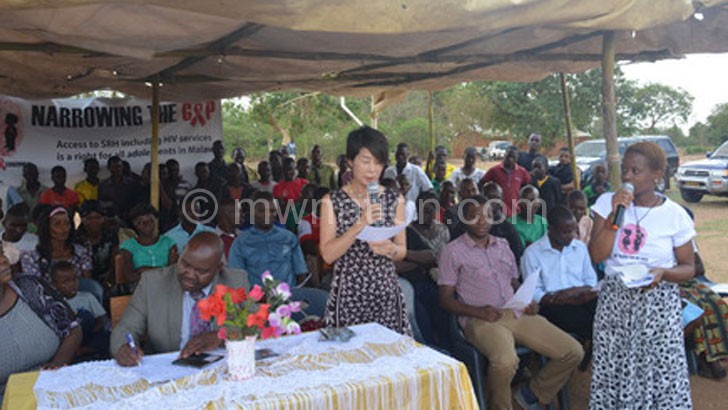Nevin drums support for girl education
Wife to British High Commissioner Michael Nevin, Sawako, has asked government and the international community to concentrate efforts on fighting challenges impeding girls from attaining education.
Nevin said this at the commemoration of 16 days of Activism on Violence against Women organised by Girls Empowerment Network (Genet).
She was guest of honour at the event held in Mchinji recently and said although current efforts were appreciated, more needed to be done.

During the event, Nevin distributed care packs to over 100 school-going girls.
She said: “I thought it is important to change these older generations’ traditional mindset against girl’s education and that is why I started a message song project called ‘Send Your Girls to School’. Under this project, I made a song called Msungwana Shaina with Lucius Banda.
“The song asks people to send their girls to school for the bright future of girls and the bright future of Malawi. It is all about yourselves, ladies.”
She said lack of sanitary pads was one of the issues affecting girls to remain in school, adding that the privileged should do more to help girls stand up for themselves.
Nevin said through several supporting ambassadors, sponsors and 100 guests, a recently-held dinner raised K2.7 million towards providing 500 girls with a pack of sanitary pads and a session of menstrual hygiene training.
“Among all the things Genet does, I particularly wanted to support their ‘reusable sanitary pads’ project which is called ‘Girl Care project’ because I knew that the lack of sanitary pads is one of the factors stopping adolescent girls from going to school,” she added.
Genet executive director Faith Phiri said there is need to raise awareness among girls and communities to ensure the girls’ safety in schools and homes.
“As civil society we are doing our part; government is doing its part, but we can also do more. A lot of work needs to be done. Girls continue to suffer violence. Violence is very common in our homes and schools,” she said.
Phiri said over 20 000 girls have been targeted for the project countrywide with 1 000 of them in Mchinji.





